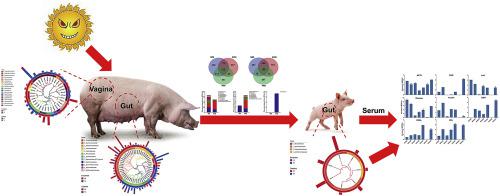Environmental Pollution ( IF 7.6 ) Pub Date : 2020-06-29 , DOI: 10.1016/j.envpol.2020.115111 Jianwen He 1 , Weijiang Zheng 2 , Chengyuan Tao 3 , Huiduo Guo 1 , Yongqiang Xue 1 , Ruqian Zhao 4 , Wen Yao 5

|
Heat stress (HS) during gestation has been associated with negative outcomes, such as preterm birth or postnatal metabolic syndromes. The intestinal microbiota is a unique ecosystem playing an essential role in mediating the metabolism and health of mammals. Here we hypothesize late gestational HS alters maternal microbial transmission and structures offspring’s intestinal microbiota and serum metabolic profiles. Our results show maternal HS alters bacterial β-diversity and composition in sows and their piglets. In the maternal intestine, genera Ruminococcaceae UCG-005, [Eubacterium] coprostanoligenes group and Halomonas are higher by HS (q < 0.05), whereas the populations of Streptococcus, Bacteroidales RF16 group_norank and Roseburia are decreased (q < 0.05). In the maternal vagina, HS mainly elevates the proportions of phylum Bacteroidetes and Fusobacteria (q < 0.05), whereas reduces the population of Clostridiales Family XI (q < 0.05). In the neonatal intestine, maternal HS promotes the population of Proteobacteria but reduces the relative abundance of Firmicutes (q < 0.05). Moreover, the core Operational taxonomic units (OTU) analysis indicates the proportions of Clostridium sensu stricto 1, Romboutsia and Turicibacter are decreased by maternal HS in the intestinal and vaginal co-transmission, whereas that of phylum Proteobacteria and Epsilonbacteraeota, such as Escherichia-Shigella, Klebsiella, Acinetobacter, and Comamonas are increased in both the intestinal and vaginal co-transmission and the vagina. Additionally, Aeromonas is the only genus that is transmitted from environmental sources. Lastly, we evaluate the importance of neonatal differential OTU for the differential serum metabolites. The results indicate Acinetobacter significantly contributes to the differences in the adrenocorticotropic hormone (ACTH) and glucose levels due to HS (P < 0.05). Further, Stenotrophomonas is the most important variable for Cholesterol, low-density lipoprotein (LDL), diamine oxidase (DAO), blood urea nitrogen (BUN) and 5-hydroxytryptamine (5-HT) (P < 0.10). Overall, our data provides evidence for the maternal HS in establishing the neonatal microbiota via affecting maternal transmission, which in turn affects the maintenance of metabolic health.
中文翻译:

妊娠晚期的热应激会破坏母猪的微生物传播,并改变猪模型中后代的肠道微生物定植和血清代谢产物。
妊娠期热应激(HS)与不良结局相关,例如早产或产后代谢综合征。肠道菌群是一个独特的生态系统,在介导哺乳动物的新陈代谢和健康中起着至关重要的作用。在这里,我们假设妊娠后期HS会改变母亲的微生物传播,并构造后代的肠道菌群和血清代谢谱。我们的结果表明母体HS会改变母猪及其仔猪的细菌β多样性和组成。在产妇肠中,Ruminococcaceae UCG-005属,[Eubacterium] coprostanoligenes组和Haloomonas的HS值较高(q <0.05),而链球菌,拟杆菌RF16 group_norank和Roseburia降低(q <0.05)。在孕产妇阴道中,HS主要增加了拟杆菌门和Fusobacteria的比例(q <0.05),而减少了梭菌家族XI的数量(q <0.05)。在新生儿肠中,产妇HS促进了变形杆菌的繁殖,但降低了Firmicutes的相对丰度(q <0.05)。此外,核心操作生物分类单位(OTU)分析表明了Censtridium sensu stricto 1,Romboutsia和Turicibacter的比例。母体在肠道和阴道的共同传播中的HS降低,而肠道,阴道和阴道的共同传播中,Proteobacteria和Epsilonbacteraeota的门如Escherichia-Shigella,Klebsiella,不动杆菌和Comamonas的升高。此外,气单胞菌是从环境来源传播的唯一属。最后,我们评估了新生儿差异OTU对差异血清代谢物的重要性。结果表明,不动杆菌明显地促进了促肾上腺皮质激素(ACTH)和葡萄糖水平的差异(P <0.05)。进一步,对于胆固醇,低密度脂蛋白(LDL),二胺氧化酶(DAO),血尿素氮(BUN)和5-羟色胺(5-HT),嗜麦芽窄食单胞菌是最重要的变量(P <0.10)。总体而言,我们的数据为母亲HS通过影响母亲传播建立新生儿微生物群提供了证据,而母亲继而又影响了代谢健康的维持。











































 京公网安备 11010802027423号
京公网安备 11010802027423号